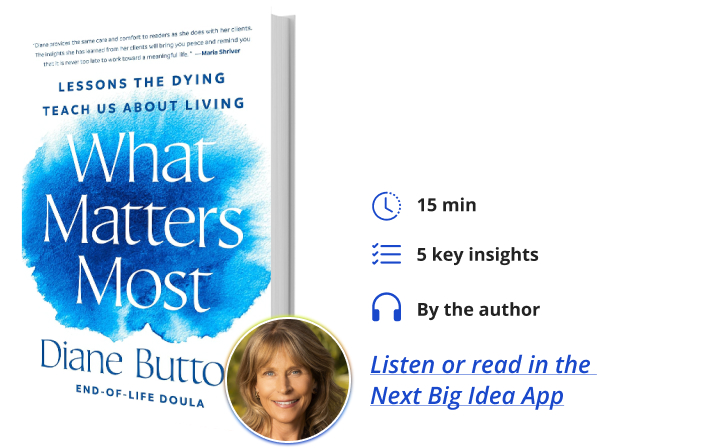Below, Diane Button shares five key insights from her new book, What Matters Most: Lessons the Dying Teach Us About Living.
Diane has been a death doula for two decades now, meaning she is a companion for people at the end of life. She has sat beside people with no time left to waste and nothing left to prove, continually learning from the profound insights they leave behind. She is a founding partner of the Bay Area End-of-Life Doula Alliance and an instructor for the University of Vermont’s End-of-Life Doula Professional Certificate Program.
What’s the big idea?
What Matters Most shares lessons from sacred conversations held at the end of life. Stories shared by the dying hold wisdom about how to live with purpose, courage, connection, and a deep understanding of what truly matters.

1. The ordinary is everything.
What does it really mean to live like you are dying? Go skydiving? Ride a bull? Those may sound fun, but insights from people who are actually dying are often simpler and much deeper.
One client told me, “I just want to sit in my own kitchen one more time, with the people I love and a bowl of warm, fresh pasta with parmesan cheese melting on top.” That was his dream. Not a trip to Bali. Not bungee jumping. Just warm pasta, family, and home.
I used to expect that people would reminisce about big events like weddings, awards, or epic vacations. But over and over, what they actually longed for were the simplest pleasures.
My client Bernice had lived an extravagant life. Her walls were covered with perfectly posed photographs of big events from her life. But in her final months, she said, “I wish I had different pictures on the wall—messy ones. Pajama parties with friends, Sunday night movies with my kids, and neighborhood barbeques.” Those were the memories that stirred her soul.
“But over and over, what they actually longed for were the simplest pleasures.”
We spend so much of life chasing big moments, but the dying often remind me that it’s not the grand gestures that matter most in the end. It’s the small, ordinary things. A meaningful life is built in everyday moments. Not in the highlight reel, but in the quiet, ordinary spaces in-between.
The dying know something we seem to have forgotten: Life is happening right now. In the warm pasta. During the neighborhood barbecue. In the sound of your favorite voice calling your name. Big events are wonderful, but in the end, the ordinary is everything.
2. Count your joy.
People facing the end of their lives are often among the most joyful people I’ve ever known. Why is that? Well, they are consciously looking for it! They’re in the present, soaking in what remains during the time they have left.
There’s a freedom that comes when time is short. When the to-do lists fall away and expectations fade, what’s left are the few things that really matter: holding someone’s hand, laughing with a friend, feeling the sun on your face. In that space, joy has room to show up. But you have to pause, acknowledge it, and hopefully share it with someone special.
Jacob was one of those people who found a way to experience joy, despite the fact that he was dying of brain cancer in his early 40s. By the time my colleague Gabby met him, Jacob was confined to a bed. He had been a speed cyclist and a nature-lover until his world changed completely.
And yet, Jacob discovered something beautiful. He had a small metal box hanging from the grab bar above his bed that he called his joy counter. It was a simple tally device, like the kind you’d use to count inventory or attendance. Every time Jacob experienced a moment of joy, he’d click it. The “joy number” just kept climbing higher:
- A bite of pistachio ice cream…click.
- A visit from a friend…click.
- A good joke…click.
- The love of his wife, Carla…click, click, click.
Clicking the counter shifted everything for Jacob. It reminded him of what was still good, and what was still his. The more Jacob used the joy counter, the more joy he found to count. He taught us that joy is not the absence of pain or loss, but rather the presence of kindness, humor, connection, and love.
I’ve taken to asking myself: Where did I find joy today? Because joy—real, honest, quiet joy—is almost always here. You just have to look for it. You just have to count it.
3. Live with a clean slate.
At the end of life, I often use a tool with my clients that helps bring clarity, peace, and meaning into focus. I call it The Final Checklist. It’s a set of simple but powerful questions that help uncover what’s unfinished, unsaid, or just off track.
I created this checklist after working with hundreds of clients, many of whom had regrets—not because of what they’d done, but because of what they never got around to. Like all of us, they thought they’d have more time. It’s time to say the thing, fix the thing, and do the thing.
One client, Nathan, was diagnosed with ALS in his early 50s. He could no longer speak or walk, yet his mind and heart were wide awake, with so much left unsaid. He typed out his thoughts one knuckle at a time. A single message could take him all night. In one very long letter, he wrote, “I always thought I would have more time.”
Nathan tried to make amends: reach out to old friends, say thank you, I’m sorry, I love you. Sadly, Nathan ran out of time. His story is one of heartbreak. But it’s also one of wisdom, because it reminds us to start now. Ask yourself: Am I living the life I want to be remembered for? Am I saying what I need to say? Am I clear about who and what matter most?
“It’s time to say the thing, fix the thing, and do the thing.”
Every month, I journal through the six questions and hold them in my mind for a few quiet moments. Whenever I return to them, I notice something new. A relationship I want to repair. A conversation I need to have. A small act of joy I’ve been putting off for someday.
This short and simple six-question checklist isn’t just about cleaning up regrets at the end of life. It’s about building a life so full of love, honesty, presence, and joy that by the time we get to the end, we’re already at peace. The goal isn’t to have a perfect checklist when we die. It’s to live a life so true and full that there’s nothing left to add.
4. Kindness builds community.
We all say we want more connection and belonging, but real community doesn’t just happen. It’s built, deliberately and consistently, through small acts of kindness.
My husband and I, along with our three small children, had just moved to Nashville when I was diagnosed with breast cancer. We hardly knew anyone. Then came surgery, chemo, fatigue, and a lot of uncertainty. We were scared.
One day, our neighbor Becky knocked on the door, gave me a huge hug, and said, “Just so you know, you won’t be cooking for a while. We’ll take care of you. This is what Nashville women do.” And just like that, we were held. Not by grand gestures, but by casseroles and a calendar filled with names—some I recognized, many I didn’t. I cried often for the overwhelming grace of being cared for by strangers who became community.
At the end of life, people ask: Did I make a difference? Is the world a better place because I was here? Those questions aren’t answered by résumés or big achievements. They’re answered by casseroles, hugs, and the way we show up for each other, especially when it’s hard.
“Those questions aren’t answered by résumés or big achievements.”
Even while dying of cancer, my client Martine was building a fence for a neighbor. When I gently asked if he needed to slow down, he said, “I’m not going to stop caring for my neighbors until my feet can’t walk and my arms can’t hug.”
One day, while I was visiting him, a young family walked in carrying hot food, a salad, and a bag of tangerines. The little boy walked over to Martine, gently opened his hand, and placed a tangerine in his palm. This is what matters. You don’t have to build a hospital wing. You just have to show up. In the end, small things—offered with kindness and love—become everything.
5. Don’t miss the moments.
My client, Hendricks, made me pause and think about how I spend my time. When I first got to Hendricks’ house, I went through a giant gate that meandered up a long driveway to his mansion at the top of a hill. He had a 360-degree view of his sprawling vineyards.
Hendricks was a man of few words, often staring out at the vineyards during my weekly visits. But one day, when I arrived, I saw him outside, sitting on the porch in his rocking chair. He didn’t say hello, but instead stayed with his thoughts and said, “I’ve been obsessed with grapes my entire life.”
After a deep sigh, he continued, “As I look out today, I see this successful winery and vast fortune I’ve managed to create, yet look at my home. It’s empty and so quiet. How is it possible for one man to have so much and also to have so little?”
“He missed the moments that matter most, and his remorse was painful to hear.”
Hendricks missed it. He missed the moments that matter most, and his remorse was painful to hear. He had spent so much time accumulating money and fame that he hadn’t paid attention to the people he loved. As I listened to his story, I couldn’t help but think about the giant house, the empty chairs, the white walls, and the tall ceilings. I wondered how long it had been since love and laughter filled that home. Hendricks tried to reconnect with his family, but no one came. He died with a caregiver holding his hand.
Though this is a sad story, it was a beautiful lesson. As I drove away from his house, I thought to myself, don’t miss the moments because the moments turn into days that turn into months, and then they turn into the years that link together to form a life.
Enjoy our full library of Book Bites—read by the authors!—in the Next Big Idea App:
































